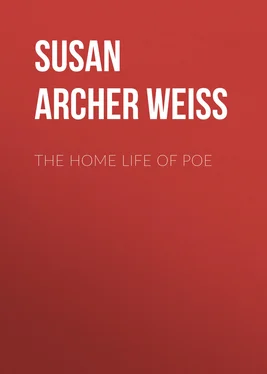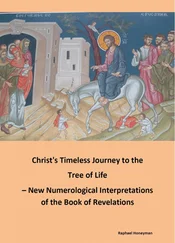Susan Archer Talley Weiss - The Home Life of Poe
Здесь есть возможность читать онлайн «Susan Archer Talley Weiss - The Home Life of Poe» — ознакомительный отрывок электронной книги совершенно бесплатно, а после прочтения отрывка купить полную версию. В некоторых случаях можно слушать аудио, скачать через торрент в формате fb2 и присутствует краткое содержание. Жанр: Биографии и Мемуары, foreign_antique, на английском языке. Описание произведения, (предисловие) а так же отзывы посетителей доступны на портале библиотеки ЛибКат.
- Название:The Home Life of Poe
- Автор:
- Жанр:
- Год:неизвестен
- ISBN:нет данных
- Рейтинг книги:4 / 5. Голосов: 1
-
Избранное:Добавить в избранное
- Отзывы:
-
Ваша оценка:
- 80
- 1
- 2
- 3
- 4
- 5
The Home Life of Poe: краткое содержание, описание и аннотация
Предлагаем к чтению аннотацию, описание, краткое содержание или предисловие (зависит от того, что написал сам автор книги «The Home Life of Poe»). Если вы не нашли необходимую информацию о книге — напишите в комментариях, мы постараемся отыскать её.
The Home Life of Poe — читать онлайн ознакомительный отрывок
Ниже представлен текст книги, разбитый по страницам. Система сохранения места последней прочитанной страницы, позволяет с удобством читать онлайн бесплатно книгу «The Home Life of Poe», без необходимости каждый раз заново искать на чём Вы остановились. Поставьте закладку, и сможете в любой момент перейти на страницу, на которой закончили чтение.
Интервал:
Закладка:
When Edgar was about fifteen or sixteen he began to make trouble for Miss Jane. Repeatedly she would detect him in secret correspondence with some one of her fair pupils, supplemented on his part by offerings of candy and "original poetry," his sister Rosalie being the medium of communication. The verses were sometimes compared by the fair recipients and found to be alike, with the exception of slight changes appropriate to each; a practice which he kept up in after years. He possessed some skill in drawing, and it was his habit to make pencil-sketches of his girl friends, with locks of their hair attached to the cards.
Poe himself has told of his boyish devotion to Mrs. Stanard, which made so deep an impression upon the mind and heart of the embryo poet. The story is well known of how he once accompanied little Robert Stanard home from school (to see his pet pigeons and rabbits), and how his heart was won by the gentle and gracious reception given him by the boy's lovely mother, and the tenderness of tone and manner with which she talked to him; she knowing his pathetic history. In his heart a chord of feeling was stirred which had never before been touched; and thenceforth he regarded her with a passionate and reverential devotion such as we may imagine the religious devotee to feel for the Madonna. He calls this "the first pure and ideal love of his soul," and possibly it may in time have been increased by the knowledge of the doom which hung above and overtook her at the last—the partial shrouding of the bright intellect, the effect of a hereditary taint. Indeed, it is probable that on this account Poe saw very little if anything of Mrs. Stanard in the two succeeding years, in which time she led a secluded life with her family, dying in April, 1824, at the age of thirty-one. But the impression had been made, and remained with him during his lifetime, forming the one solitary Ideal which pervaded nearly all his poems—the death of the young, lovely and beloved. This experience was probably the beginning of those occasional dreamy and melancholy moods about this time noticed by some of his companions. The living friend of his boyhood's dream became the "lost Lenore" of his maturer years.
But though Poe deeply felt the loss of this beloved friend, the story is not to be accepted that he was accustomed to go at night to the cemetery where she was buried "and there, prostrate on her grave, weep away the long hours of cold and darkness." No one who knew Poe in his boyhood, with his horror of cemeteries, of darkness, and of being alone at night, would believe this story, first told by Poe himself to Mrs. Whitman, and by her poetic fancy further embellished. Besides this is the practical refutation afforded by the high brick wall and locked gates of the cemetery, with the strict discipline of the Allan home, which would have made such midnight excursions impossible.
Another account connected with Mrs. Stanard, and repeated by Poe's biographers until it has become an article of faith with the public, is that the exquisite lines "To Helen" were inspired by and addressed to that lady. If written at ten years of age, as Poe asserts, it will be remembered that he was at this time at school in London, and it was not until two years after his return, and when he was thirteen years of age, that he ever saw Mrs. Stanard. He might have altered the lines to suit her—his "Psyche," with the pale and "classic face"—and I recall that the "folded scroll" of the first version was afterward changed to "the agate lamp within thy hand," as more appropriate to Psyche. Poe never made an alteration in his poems that was not an improvement.
Those who knew Mrs. Stanard describe her as slender and graceful, with regular delicate features, a complexion of marble pallor and dark, pensive eyes. A portrait of her which was in possession of her son, Judge Robert Stanard, represented her as a young girl wearing—perhaps in respect to her Scottish descent—a snood in her dark, curling hair.
CHAPTER VI
ROSALIE POE
Of Edgar Poe's sister, Rosalie, it may be said that all accounts represent her as having been, up to the age of ten years, a pretty child, with blue eyes and rosy cheeks, and of a sweet disposition. Though evincing nothing of Edgar's talent and quickness at learning, she was yet a rather better pupil than the average; and it had been Miss Mackenzie's intention to give her every advantage of education afforded by her own school, so as to fit her for becoming a teacher.
But when Rosalie Poe was in her eleventh or twelfth year, a strange change came over her, for which her friends could never account. Without having ever been ill, a sudden blight seemed to fall upon her, as frost upon a flower, and she drooped, as it were, mentally and physically. She lost all energy and ambition, and thenceforth made little or no progress in her studies, growing up into a languid and uninteresting girlhood. Still, she was amiable, generous and devoted to her friends, who were generally chosen for their personal beauty, and for this reason my sister was a great favorite with her. To Mrs. Mackenzie she was always dutiful and affectionate, but her great pride and affection centered in her brother. She felt painfully, and would often allude to, the difference between them. Once she said to me, "Of course, I can't expect Edgar to love me as I do him, he is so far above me."
A peculiarity of Miss Poe is worth mentioning, because it is one shared by her brother, and must have been hereditary. She could not taste wine without its having an immediate effect upon her. She would, after venturing to take a glass of wine at dinner, sleep for hours, and awaken either with a headache or in an irritable and despondent mood. As is well known, the same effect was produced upon Edgar by a moderate indulgence in drink, such as would not affect another man; and this hereditary weakness should go far in accounting for and excusing those excesses of which all the world is unfortunately aware.
Of the elder brother of Edgar, William Henry, I have heard scarcely any mention until after Poe's death, and few seemed to know that there was such a person. It seems, however, that in the summer, when Edgar was preparing for the University, this brother came to Richmond on a visit to himself and Rose. Edgar took him around to introduce to his young lady acquaintances, by one of whom he has been described as handsome, gentlemanly and agreeable. He died a year or two afterward, leaving some poems which show him to have been possessed of unusual poetic talent. Had he lived, he might have rivaled his brother as a poet.
CHAPTER VII
THE UNREST OF YOUTH
In the summer of 1825, Mr. Allan, having come into possession of a large fortune left him by an uncle, purchased and removed to the handsome brick residence at the corner of Main and Fifth streets, built by Mr. Gallego, a wealthy Spanish gentleman, and which became known as the Allan House.
To own such a residence had long been the desire of Mrs. Allan, and upon taking possession of the house she furnished it handsomely and commenced entertaining in a style which rendered them conspicuous in Richmond society. It was even said that they lived extravagantly; and Edgar, with abundance of pocket-money, became the envy of his companions.
But he was not happy. The impatience of restraint of which the Mackenzies spoke, and the dissatisfaction of which was to him, despite its luxuries, an uncongenial home, rendered him discontented. The heart of the boy of fifteen began to pulse with the restlessness of the bird when it feels the first nervous twitchings of its wings, and his great desire now was to get away from home and enjoy greater freedom. He would often, when particularly dissatisfied, speak to the Mackenzies of going to sea or enlisting in the army. At present, however, he contented himself with requesting Mr. Allan to send him to the University.
Читать дальшеИнтервал:
Закладка:
Похожие книги на «The Home Life of Poe»
Представляем Вашему вниманию похожие книги на «The Home Life of Poe» списком для выбора. Мы отобрали схожую по названию и смыслу литературу в надежде предоставить читателям больше вариантов отыскать новые, интересные, ещё непрочитанные произведения.
Обсуждение, отзывы о книге «The Home Life of Poe» и просто собственные мнения читателей. Оставьте ваши комментарии, напишите, что Вы думаете о произведении, его смысле или главных героях. Укажите что конкретно понравилось, а что нет, и почему Вы так считаете.












